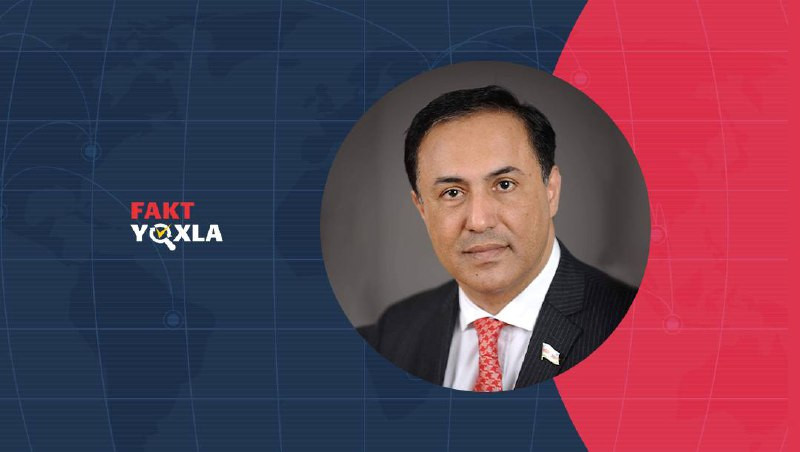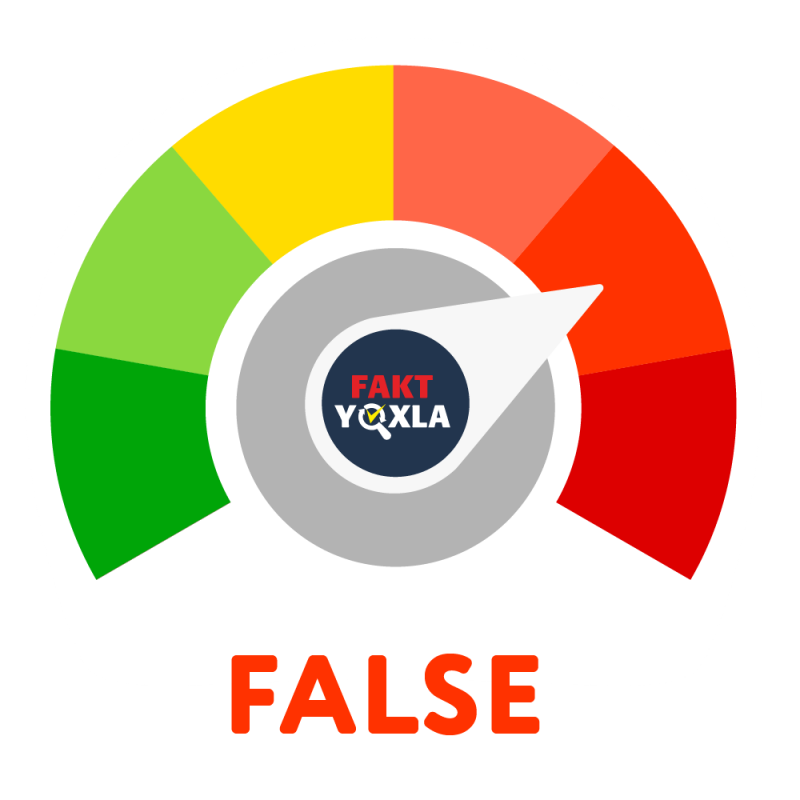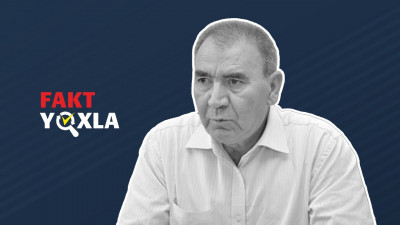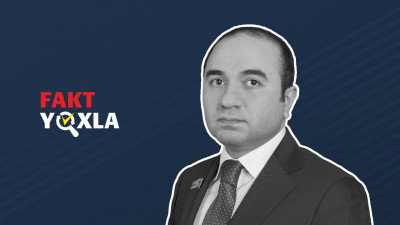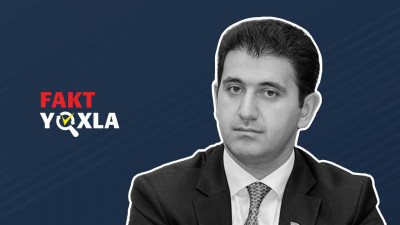MP Elman Nasirov's claim about Ali Karimli
"Supposedly, Ali Karimli has obstacles related to expressing his free opinion and barriers have been erected in front of him. His last speech once again proved that everything he said was a lie and completely contradicted the truth."
Elman Nasirov, a deputy of the Milli Majlis from the New Azerbaijan Party (YAP), said this while commenting on the speech made by the chairman of the Azerbaijan Popular Front Party (APFP), Ali Karimli, on August 12 at the Caspian Platform Forum on the topic of human resources for democratic changes.
Fakt Yoxla examined whether the MP's claim that "Supposedly, Ali Karimli has obstacles related to expressing his free opinion and barriers have been erected in front of him" was true.
In April 2020, mobile phone, home phone, and internet connections were cut off at Ali Karimli's house. Some time after this incident, the accounts of the party chairman on WhatsApp and Telegram were seized.
Although Ali Karimli and his wife Samara Seyidova appealed to the court regarding the issue, the court refused to consider the complaint. The Nasimi District Court returned their complaint.
In the part of the report on the state of human rights in the world published by the US Department of State in 2021, it was stated that on April 13, 2020, the Azerbaijani authorities cut off the Internet and telephone connections of Ali Karimli, chairman of the APFP, and his wife. Although A. Karimli appealed to the court, the court refused to consider his complaint; furthermore, Ali Karimli has been banned from leaving the country since 2006.
The rapporteur of the Parliamentary Assembly of the Council of Europe on political prisoners in Azerbaijan, Sunna Ævarsdóttir, said that the party chairman was de facto under house arrest. She said, "We are also concerned that his phones and internet have been blocked. Co-rapporteurs for Azerbaijan are familiar with this situation. The European Council is aware of the situation and is concerned about it."
Placing Ali Karimli on an information blockade is illegal interference with the citizen's freedom of thought and speech and freedom of information guaranteed by the Constitution (Articles 47 and 50), as well as the right of anyone to legally seek, receive, impart, produce, and disseminate any information, which is established by the Law on Access to Information.
In the analysis published by Fakt Yoxla in 2020 regarding the information blockade of Karimli, it was determined that it was illegal; as a result, the party chairman's rights were violated:
“Illegal information blockade has been applied to Ali Karimli, which is an unlawful interference by the government in his constitutional right to equality and freedom of expression. Interference with a politician's social media accounts, telephone and mobile phone lines is a violation of his constitutional right to live in safety and inviolability of private life. The actions against the chairman of the party contradict the provisions of the Law on Telecommunications, Law on Access to Information, and Law on Personal Data and are actions that are criminalized by criminal law. The above is also a violation of the provisions of the European Convention,” the article said.
Furthermore, since 2006, Ali Karimli has not been issued a citizen's passport. Therefore, he cannot leave the country.
As of April 1, 2021, the passport requirement for traveling from Azerbaijan to Turkey has been removed. This means that people without passports can go to Turkey with ID cards. However, since the party chairman could not go to Turkey after the entry into force of this rule, it is impossible to say that the obstacles against him have been removed.
Before this rule came into force, in 2016, Ali Karimli wanted to go to Turkey, but his trip did not take place because he did not have a passport.
The Main Passport, Registration and Migration Department of the Ministry of Internal Affairs cited the non-termination of the criminal case against Ali Karimli, which was initiated in 1994 under Article 220.1 of the Criminal Code of the Azerbaijan SSR, as the reason for not issuing him a passport.
It should be noted that Ali Karimli was arrested as an accused in this criminal case, but was later released. In 1995, the execution of that case was stopped, but the case was not terminated.
It is interesting that in the decision of the investigator of the Nasimi District Prosecutor's Office dated December 11, 1995, "failure to identify the person who committed the crime" was indicated as the reason for the termination of the case. Pursuant to Article 53.1.1 of the Code of Criminal Procedure of the Republic of Azerbaijan, criminal prosecution proceedings are suspended if the person to be involved as the accused is not identified.
Article 220.1 of the Criminal Code of the Azerbaijan SSR (carrying, storing, acquiring, preparing, or selling weapons, ammunition, or explosives without a proper permit), of which Ali Karimli was accused, was punishable by imprisonment for up to five years.
According to Article 44.3 of the Criminal Code of 1960 in force in Azerbaijan at that time, a person may not be brought to criminal responsibility if five years have passed since the day of the commission of a crime punishable by imprisonment for no more than five years.
According to Article 75.1.2 of the Criminal Code of the Republic of Azerbaijan adopted in 2000, this term is defined as seven years. According to Article 39.1.3 of the Code of Criminal Procedure, criminal prosecution cannot be initiated when the terms of criminal prosecution have expired (with the exception of the cases of suspension of the period of criminal liability), and the initiated criminal prosecution must be terminated (moreover, criminal proceedings cannot be initiated, and the proceedings on the initiated criminal case must be terminated).
This means that the non-termination of Ali Karimli's past criminal case is illegal and unfounded.
In addition, he was issued a citizen's passport, which was issued in 2001 and expired in 2006, and even a diplomatic passport as a member of parliament in 1998 and 2003.
Although Ali Karimli appealed to the local courts in Azerbaijan regarding the refusal to grant him a passport, his complaints were not satisfied.
According to Article 28.3 of the Constitution, everyone lawfully present within the territory of the Republic of Azerbaijan may freely move, choose the place of residence and leave the territory of the Republic of Azerbaijan.
The Law on Passport states that in accordance with the Universal Declaration of Human Rights and the relevant international treaties, to which the Republic of Azerbaijan is a party, this Law guarantees the right of a citizen of the Republic of Azerbaijan to leave and come to the Republic of Azerbaijan.
According to Article 9 of the Migration Code, a citizen of the Republic of Azerbaijan has the right to freely leave and enter the country, passing through the state border checkpoints.
According to this article, a citizen cannot be deprived of the right to leave and enter the country. In this Code, none of the cases in which a citizen's right to leave the country can be temporarily restricted can be applied to the chairman of the APFP.
According to Paragraph 2 of Article 2 of Protocol No. 4 of the European Convention on Human Rights, to which Azerbaijan is also a party, everyone shall be free to leave any country, including his own. Paragraph 3 of that article states that no restrictions shall be placed on the exercise of these rights other than such as are in accordance with law and are necessary in a democratic society.
In 2007, the representative of the Secretary General of the Council of Europe in Azerbaijan, Denis Bribosia, commented on this issue and said, "The fact that one of the leaders of the opposition, Ali Karimli, cannot travel abroad is not a good thing and is a serious matter."
A pre-election observation mission of the OSCE Office for Democratic Institutions and Human Rights (ODIHR) that visited Baku in 2013 found that one of the presidential candidates, Ali Karimli, could not travel abroad because he was not given a passport.
On July 16, 2015, the European Court passed judgment on this case. In that judgment, the failure to issue a passport to the chairman of the APFP was considered a violation of Article 2 (right to freedom of movement) of Protocol No. 4 of the European Convention.
The Court decided that the state should pay 8,600 euros compensation to Ali Karimli for non-pecuniary damage and other incurred expenses.
The government of Azerbaijan agreed with this judgment and did not appeal to the Grand Chamber of the European Court. Although the party chairman filed a lawsuit against the Ministry of Internal Affairs and the Main Passport, Registration and Migration Department under this body, the judge of the Baku Administrative Court, Elvin Aliyev, ruled that it was not possible to consider the lawsuit.
Fakt Yoxla concludes that Elman Nasirov's claim is False.



